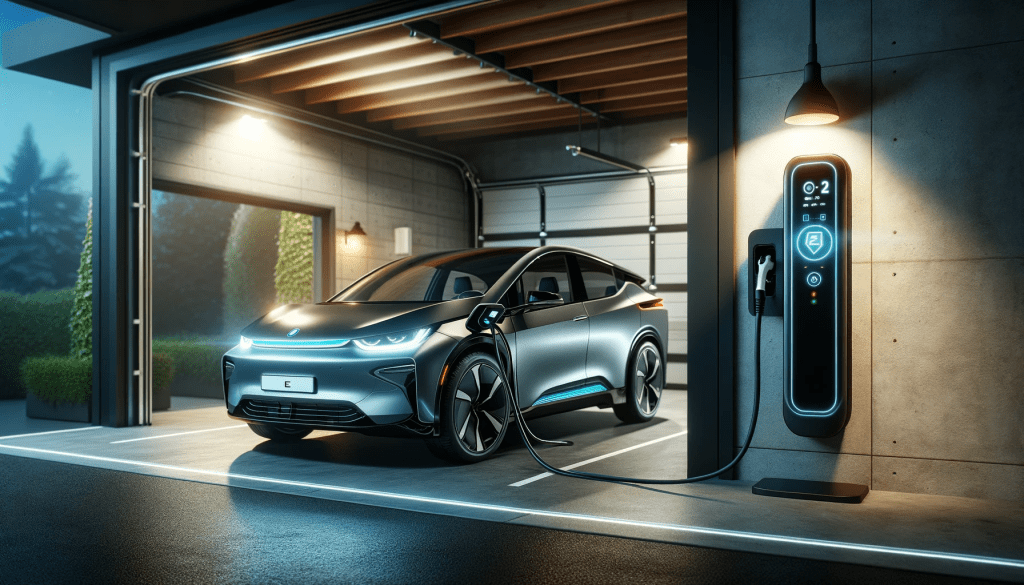The Comprehensive Guide to EV Home Chargers
The era of electric vehicles (EVs) is upon us, symbolizing a significant shift towards sustainable and efficient personal transportation. As more individuals transition from traditional gasoline-powered vehicles to electric ones, the need for convenient charging solutions has become paramount. An EV home charger is not just an accessory; it’s a cornerstone of the electric vehicle experience, ensuring your ride is always ready for the road. This comprehensive guide delves into the nuances of EV home charging, offering insights and practical advice to navigate this essential aspect of EV ownership.

The Rise of Electric Vehicles
Electric vehicles have surged in popularity due to their lower operational costs, reduced environmental impact, and advancements in technology that have significantly improved range and performance. This shift towards electric mobility has sparked a parallel evolution in the infrastructure and technology surrounding EV charging, with home charging solutions leading the charge.
Understanding EV Home Chargers
An EV home charger, often referred to as an Electric Vehicle Supply Equipment (EVSE), is a device that delivers electrical energy from an electricity source to charge your EV’s batteries. These chargers come in various types and capacities, offering different charging speeds and features to suit diverse needs and preferences.
Level 1 Chargers:
These chargers are the most basic and typically come with your vehicle. They plug into a standard household outlet (120V) and offer a slow charging rate, generally suitable for overnight charging or for EVs with smaller batteries.
Level 2 Chargers:
Level 2 chargers require a 240V outlet (similar to what large appliances like dryers use) and offer a significantly faster charging rate. They are the most popular choice for home charging, balancing speed, cost, and convenience effectively.
Installation Considerations
Installing an EV home charger might seem daunting, but with the right preparation, it can be a straightforward process. Key considerations include:
- Electrical Capacity: Ensure your home’s electrical system can handle the additional load of an EV charger, especially if you opt for a Level 2 charger.
- Location: The charger should be installed where your EV is parked, ideally in a garage or driveway, keeping in mind the length of the charging cable.
- Permits and Regulations: Check local codes and regulations to ensure compliance, and obtain any necessary permits before installation.
Professional installation by a certified electrician is recommended to ensure safety and compliance with local electrical codes.
Choosing the Right Charger
Selecting the ideal home charger depends on various factors, including your vehicle’s charging capabilities, your daily driving distance, and your budget. Consider future-proofing your investment by opting for a charger with a higher capacity than your current needs, especially if you plan to upgrade your EV or add more electric vehicles to your household in the future.
The Benefits of Home Charging
- Convenience: Charge your EV overnight, ensuring it’s always ready for your daily commute or errands.
- Cost-Effective: Charging at home is often cheaper than using public charging stations, especially if you charge during off-peak hours when electricity rates are lower.
- Increased EV Range: Regular home charging maximizes your EV’s available range, reducing range anxiety and the need for frequent stops at public charging stations.
Financial Incentives and Rebates
Many governments and utility companies offer incentives, rebates, or tax credits for installing an EV home charger, making it more affordable. Research local programs to take advantage of these financial benefits.
Smart Chargers: The Next Level of Home Charging
Smart chargers offer advanced features like remote monitoring and control via a smartphone app, scheduled charging to take advantage of lower electricity rates, and integration with home energy management systems. These features enhance the convenience and efficiency of home charging, making them an attractive option for tech-savvy EV owners.
Real-Life Case Study: John’s Transition to EV Home Charging
John, a new EV owner, initially relied on public charging stations but soon realized the need for a more convenient solution. After consulting with an electrician, he installed a Level 2 smart charger in his garage. The charger’s app allows him to monitor his charging status and schedule charging sessions during off-peak hours, significantly reducing his charging costs and enhancing his EV experience.
Challenges and Solutions
While home charging is generally reliable, potential challenges include power outages and fluctuations in electricity supply. Investing in a charger with built-in safety features, such as surge protection and fault monitoring, can mitigate these risks.
Tools and Resources for EV Owners
Several online tools and apps can help you manage your EV home charging, from calculating charging times and costs to finding the nearest public charging station when you’re on the go.
Frequently Asked Questions
- Can I install an EV charger myself? While it’s technically possible, professional installation is strongly recommended for safety and compliance reasons.
- How long does it take to charge an EV at home? Charging times vary based on the charger level, the EV’s battery capacity, and the battery’s current state of charge. Level 1 chargers can take over 24 hours for a full charge, while Level 2 chargers can typically charge an EV overnight.
The Future of Home EV Charging
As electric vehicles become more prevalent, home EV charging will continue to evolve, with advancements in technology leading to faster, smarter, and more efficient charging solutions. Wireless charging and solar-powered chargers are among the exciting developments on the horizon.
Compelling Statistics
The global electric vehicle market is expected to grow exponentially in the coming years, with projections suggesting that EVs will constitute a significant portion of new car sales by 2030. This growth underscores the increasing importance of home EV charging solutions in the broader transition to sustainable transportation.
In conclusion, installing an EV home charger is a wise investment for any electric vehicle owner, offering unmatched convenience and efficiency. By understanding the types of chargers, installation requirements, and the benefits of home charging, you can make an informed decision that enhances your EV ownership experience, aligning with the global shift towards cleaner, more sustainable mobility.